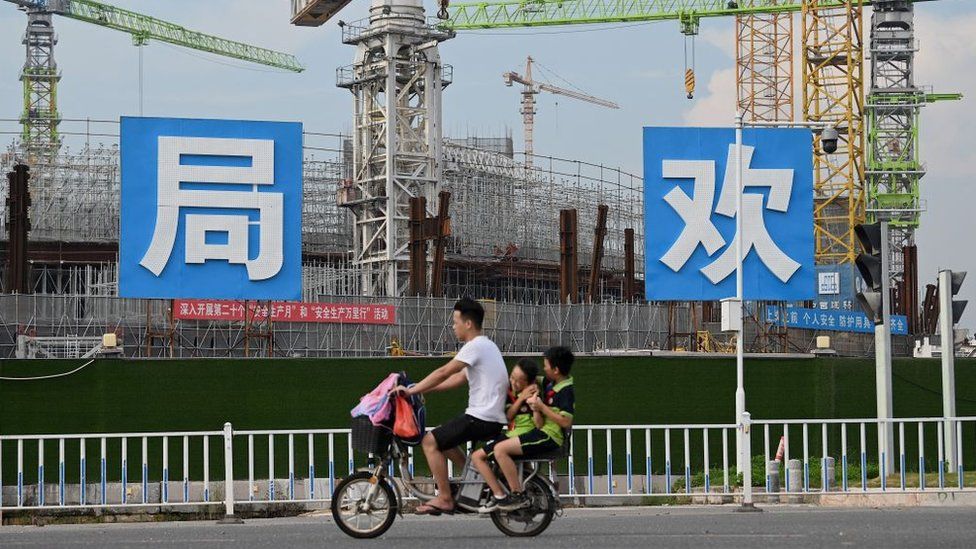Evergrande: Why should I care if China property giant collapses?
- Published

The crisis at the world's most indebted property developer Evergrande has deepened as a court in Hong Kong ordered the company to be wound up.
Trading in the company's shares was suspended in Hong Kong after the ruling.
It marks another blow to the troubled firm which in 2021 was declared to be in default after missing a crucial repayment deadline, triggering China's current real estate market crisis.
Last September, its chairman was placed under police surveillance following earlier reports that other current and former executives at Chinese property giant Evergrande had also been detained.
What does Evergrande do?
Businessman Hui Ka Yan founded Evergrande, formerly known as the Hengda Group, in 1996 in Guangzhou, southern China.
According to the company's website, Evergrande Real Estate currently owns more than 1,300 projects in more than 280 cities across China.
The broader Evergrande Group encompasses far more than just real estate development.
Its businesses range from wealth management to making electric cars and food and drink manufacturing. It even owns a controlling stake in what was one of the country's biggest football teams, Guangzhou FC.
Mr Hui was once Asia's richest person with his fortune estimated at $42.5bn (£34.8bn) by Forbes, but his wealth has plummeted since then, largely as Evergrande's problems have grown.
Why is Evergrande in trouble?
Evergrande expanded aggressively to become one of China's biggest companies by borrowing more than $300bn.
In 2020, Beijing brought in new rules to control the amount owed by big real estate developers.
The new measures led Evergrande to offer its properties at major discounts to ensure money was coming in to keep the business afloat.
Now it is struggling to meet the interest payments on its debts.
This uncertainty has seen Evergrande's shares lose 99% of their value in the past three years.
Last August, the firm filed for bankruptcy in New York, in a bid to protect its US assets as it worked on a multi-billion dollar deal with creditors.
Why would it matter if Evergrande collapses?
There are several reasons why Evergrande's problems are serious.
Firstly, many people bought property from Evergrande even before building work began. They have paid deposits and could potentially lose that money if it goes bust.
There are also the companies that do business with Evergrande. Firms including construction and design firms and materials suppliers are at risk of incurring major losses, which could force them into bankruptcy.
The third is the potential impact on China's financial system: if Evergrande collapses, banks and other lenders may be forced to lend less.
This could lead to what is known as a credit crunch, when companies struggle to borrow money at affordable rates.
A credit crunch would be very bad news for the world's second largest economy, because companies that can't borrow find it difficult to grow, and in some cases are unable to continue operating.
This may also unnerve foreign investors, who could see China as a less attractive place to put their money.
Is Evergrande 'too big to fail'?
The very serious potential fallout of such a heavily indebted company collapsing has led some analysts to suggest that Beijing may step in to rescue the company.
However, Jackson Chan from financial markets research platform Bondsupermart does not think that will now happen.
"To be honest, Evergrande has already collapsed," says Mr Chan, adding that he believes "it is on the brink of a forced liquidation".
This could have a major effect on China's economy as the property sector contributes roughly a quarter of its growth.
Mr Chan also suggests that the country could be following a similar path to Japan in the 1980s, when it slipped into decades of economic stagnation.
However, others think it is unlikely that Evergrande will be allowed to completely collapse.
"That could spiral, affecting other indebted companies and further hurt the overall property sector which is very important to the growth of the economy," Dexter Roberts, director of China affairs at the Mansfield Center at the University of Montana, told the BBC.
"At the same time, many people whose household wealth is mainly in their apartments will also be badly hurt," he added.
Mr Roberts, who spent more than two decades in China as a journalist, said "the old Evergrande no longer exists" and while the authorities may keep it afloat, "it will be as a radically diminished company."
Reporting by Peter Hoskins and Mariko Oi
Related Topics
- Published29 January
- Published28 September 2023
- Published26 September 2023
- Published18 September 2023
- Published28 August 2023